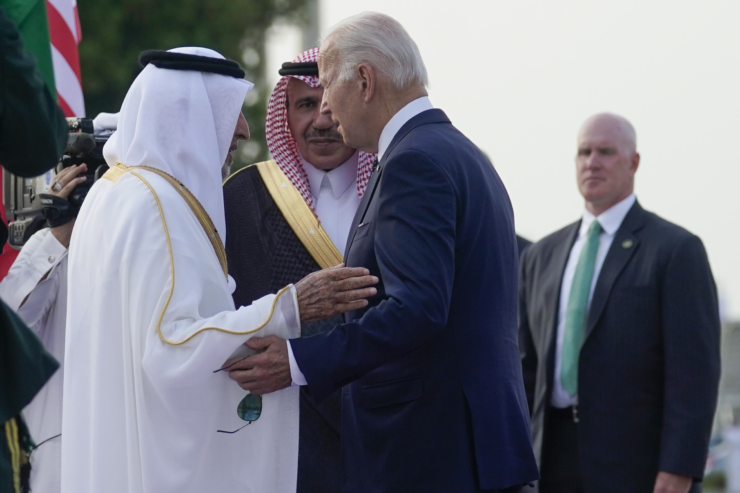The recent China-brokered rapprochement between Saudi Arabia and Iran has really shaken Washington’s understanding of the reach of China’s global geopolitical clout. China’s active diplomacy announced, yet again, a formal end of Beijing’s long-cherished policy of ‘non-interference.’ Beijing is now actively intervening, although diplomatically and not militarily, across the world to remove various geopolitical blockades (e.g., regional rivalries encouraged by the US) imposed by the US across the world to maintain its own hegemony. For China, it is crucial to reimagine its global standing. For the US, however, it is also equally crucial to tackle China to maintain its own role. Nowhere is this diplomatic tussle more evident today than in the Middle East/Persian Gulf region. Following years of the US ‘withdrawal’ from the Middle East and increasing focus on Southeast Asia/Indo-Pacific, China’s emerging role in the Middle East replacing the US has forced the latter to return to the region to galvanise its dwindling prospects. The question is: Can Washington take the Middle East back in time? We shall see that shortly.
As reports indicate, the Joe Biden administration is sending its top officials – the National Security Advisor and the Secretary of State – to Saudi Arabia to kick-start a ‘new’ phase of US-Saudi ties with a special focus on a triangle of countries including Israel. The politics of re-set follows the unannounced visit of CIA director Bill Burns to Saudi in April. Burns was quick to criticise Riyadh for its opening to Iran and Syria via China and Russia respectively without running it by Washington first.
Burns’ visit was followed by the US presidential advisor Brett McGurk’s visit to Saudi in April, where Brett met top Saudi officials, including Muhammad bin Salman (MBS). This is to be followed by National Security Advisor Jake Sullivan’s visit in May-June followed by Antony Blinken’s visit in June.
These trips are serious enough, evident from the fact that the US officials are not yet publicly and officially talking about them in order to avoid any controversy before meeting their Saudi counterparts. State officials usually maintain such levels of silence when they want to make offers that cannot be publicly discussed and debated, and/or when stakes are too high to be revealed. But there is no denying that the main factor driving this entire re-focus on Saudi is the dominance of China at the expense of the US’s role in the Middle East and/or the strategic region of the Persian Gulf.
Therefore, what the US is offering to Saudi is ways of countering China, including ways of developing alternative global supply chains as part of the wider US geopolitics of “decoupling” from China. In short, the US is going to offer Saudi and Emirate officials lucrative deals in exchange for their support for the US policy of “decoupling.”
Will this transpire and work for the US? This is quite unlikely for various reasons. First of all, the US continues to underestimate the strength of China’s ties with the Middle East. Second of all, the US remains blind to the fact that these states are sitting on the fence to exploit any opportunity that the current global scenario offers them to enhance their own power and influence. In this context, if these powers think that ties with Washington are necessary for meeting some of their interests – the Saudi recently offered dozens of aeroplanes from Boeing worth billions of US dollars as part of its own policy to modernise itself – they also understand that these ties don’t have to be established at the expense of their ties with China, just as their ties with China need not come at the expense of their ties with Washington.
In this context, any US attempt to seek a “full reset” with Saudi cannot simply work because a full reset means moving back to the US orbit and losing the strategic autonomy that Saudi is striving hard to achieve to raise its global profile within a multipolar world. A full reset, on the contrary, means reinforcing a unipolar world offering no real strategic autonomy.
How else one can explain a fast Saudi shift towards the Shanghai Cooperation Organization (SCO), known in the West as the “Asian NATO”? The SCO is a China-led regional set-up. With Saudi already a “dialogue member” of the SCO, a US attempt at convincing Saudi to counter China and become a keychain in the alternative global supply route seems like a non-starter.
In fact, such an offer seems unrealistic and not very well-formulated. Effectively, such an offer only shows the prevailing sense of panic in the US in the wake of multiple defeats. The US and its NATO allies have failed to defeat Russia in Ukraine. China and Russia have jointly succeeded in starting a major process of normalisation in the Middle East, and their growing ties with the Middle East, coupled with the Middle Eastern states’ own search for global autonomy, is at the heart of the US failure to convince, or force, Saudi Arabia to break the OPEC+ deal with Russia.
For these reasons, any US attempt to bring Saudi back into its own orbit is quite unlikely to succeed. On the contrary, such offers are quite likely to see China (and Russia) making their own advances in the Middle East to keep the space as restricted for Washington as possible. For the Middle East – especially, the Saudis – there can possibly be no better news than being wooed by two competing superpowers for an alliance. The Saudis are all set to reap all possible benefits from it.
Salman Rafi Sheikh, research-analyst of International Relations and Pakistan’s foreign and domestic affairs, exclusively for the online magazine “New Eastern Outlook.“
 RSS Feed
RSS Feed















 May 23rd, 2023
May 23rd, 2023  Awake Goy
Awake Goy 
 Posted in
Posted in  Tags:
Tags: 













